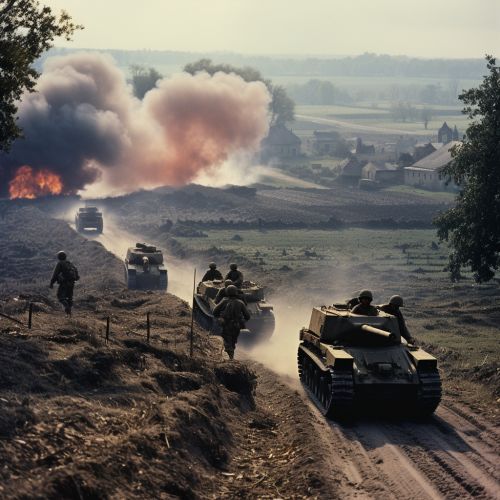Blitzkrieg
Introduction
Blitzkrieg, translated as "lightning war," is a military doctrine that emphasizes speed, surprise, and overwhelming force. This tactic was first used to significant effect by Germany during World War II, and has since been studied and adapted by military strategists worldwide.
Origins and Development
The concept of Blitzkrieg was born out of the experiences of World War I, where static trench warfare resulted in high casualties and little territorial gain. German military theorists such as Heinz Guderian and Hans von Seeckt sought to avoid a repeat of this scenario by developing a new approach to warfare. This approach emphasized mobility, combined arms, and the concentration of firepower to achieve a swift and decisive victory.


Principles of Blitzkrieg
Blitzkrieg is characterized by a number of key principles. The first is the use of speed and surprise to disorient and disrupt enemy forces. This is achieved through the use of mechanized units, such as tanks and armored vehicles, which can move quickly and strike hard. The second principle is the concentration of forces at the point of attack. This allows for a breakthrough of enemy lines, which can then be exploited by fast-moving units. The third principle is the use of combined arms, where different types of units support each other to maximize their effectiveness.
Implementation during World War II
During World War II, the German military successfully implemented Blitzkrieg tactics in a number of campaigns. The invasion of Poland in 1939 and the Battle of France in 1940 are prime examples of Blitzkrieg in action. In both cases, the German forces were able to achieve quick and decisive victories, largely due to their effective use of Blitzkrieg tactics.
Impact and Legacy
The impact of Blitzkrieg on modern warfare cannot be overstated. It revolutionized the way wars are fought, shifting the emphasis from static defensive lines to mobile offensive operations. The principles of Blitzkrieg have been incorporated into the doctrines of many modern militaries, including the United States Armed Forces and the Russian Armed Forces.
Criticisms and Limitations
Despite its successes, Blitzkrieg has its limitations and has been criticized on a number of fronts. Some argue that it is overly reliant on technology and logistics, and that it can be countered by a well-prepared and determined defense. Others point out that Blitzkrieg is not a one-size-fits-all solution, and that its effectiveness depends on a number of factors, including terrain, weather, and the capabilities of the opposing force.
